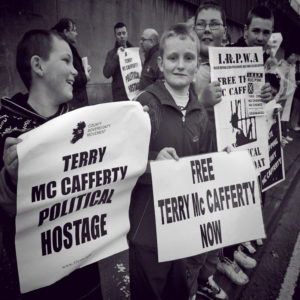Un uomo di Belfast, rimandato in carcere in base ad informazioni di intelligence secondo cui è un leader della Real IRA pronto a progettare attacchi subito dopo il suo rilascio, ha presentato esposto contro la decisione

I suoi legali affermano che il potere di revoca spetta solo al Segretario di Stato Shaun Woodward.
Sebbene abbia già perso un appello contro la decisione, i legali di McCafferty hanno cercato la certificazione per portare il caso davanti alla Corte Suprema di Londra, in un punto di diritto di interessa generale.
La loro richiesta era stata rifiutata da un comitato composto da 3 giudici della Corte d’Appello.
Comunque un avvocato di McCafferty ha confermato l’intenzione di presentare la petizione direttamente alla Corte Suprema.
Il quarantunenne, della zona di New Lodge a Belfast, nel luglio 2005 è stato condannato a 12 anni per possesso di esplosivi.
Fu rilasciato dietro licenza lo scorso novembre, solo per essere arrestato nuovamente il mese seguente e rispedito nel carcere di Maghaberry.
Goggins autorizzò la revoca della licenza basandosi sul fatto che la continua libertà di McCafferty avrebbe messo a rischio la popolazione, con la possibilità di compiere altri reati.
IIn seguito al respingimento di un atto di habeas corpus, McCafferty ha cercato di ribaltare la decisione rivolgendosi alla Corte d’Appello.
Affermazioni
Respingendo la richiesta lo scorso mese, i giudici hanno comunicato i contenuti della lettera del Ministro della Sicurezza nella quale forniva le ragioni per la revoca della licenza.
Si dichiarava: “Raggiungendo quella decisione Paul Goggins ha utilizzato le informazioni fornitegli, secondo cui tu sei un leader e membro attivo della RIRA, che ha occupato la posizione di Officer Commanding dei prigionieri RIRA nella prigione di Maghaberry, prima del rilascio dal carcere avvenuto a novembre 2008.
“Durante la tua condanna, sei rimasto in regolare contatto con importanti membri della RIRA e coinvolto direttamente negli affari della RIRA, e hai mostrato un chiaro desiderio di proseguire il coinvolgimento dell’attività RIRA dopo il tuo rilascio, compresa la pianificazione di attacchi che rappresenterebbero una minaccia per la sicurezza della popolazione.
“Fin dal rilascio sei stato in contatto regolare con importanti membri RIRA. E’ dimostrato che hai ricoperto un ruolo importante nell’organizzazione e sei stato coinvolto nei piani per eseguire degli attacchi”.
McCafferty ha negato categoricamente il contenuto della lettera, contenuta nel sommario del giudizio di nove pagine emesso dalla Corte d’Appello.
Il suo team di legali ha affermato che il Ministro della Sicurezza era prevenuto perché era improbabile raggiungere una decisione indipendente (e imparziale) su qualcuno ritenuto una minaccia.
Viene anche spiegato che il ministro probabilmente ha accesso a “informazioni particolari” che non sono state mostrate a McCafferty o ai suoi consiglieri per motivi di sicurezza.
Ma i giudici non hanno trovato sostanza nel ricorso e hanno dichiarato che il Ministro della Sicurezza era abilitato a prendere importanti decisioni.
Tratto da Utv
Real IRA ‘leader’ in Supreme Court bid
A Belfast man sent back to jail based on intelligence claims that he was a Real IRA leader planning terror attacks immediately after his release is to take his legal challenge to Britain’s highest court.
His lawyers argue that only Secretary of State Shaun Woodward had the power to order his return to prison.
Even though he has already lost an appeal against the decision, McCafferty’s legal team have sought certification to take the case before the Supreme Court in London on a point of law of general public importance.
Their request was refused by a three-judge panel sitting in the Court of Appeal.
However, a solicitor for McCafferty later confirmed his intention was now to petition the Supreme Court directly.
The 41-year-old, from the New Lodge area of the city, received a 12-year sentence in July 2005 after being convicted of possessing explosives.
He was released on licence last November, only to be rearrested the following month and returned to Maghaberry Prison near Lisburn, Co Antrim.
Mr Goggins authorised the revocation on the grounds that his continued liberty would put the public at risk and the possibility of further offences.
Following a failed application for a writ of habeas corpus, McCafferty sought to overturn the decision in the Court of Appeal.
Allegations
In dismissing that challenge last month, judges set out the contents of the letter from the Security Minister giving reasons for revoking his licence.
It stated: “In reaching that decision Paul Goggins had regard to information made available to him that you are a leading and active member of the RIRA, who held the position of officer commanding of RIRA prisoners within HMP Maghaberry prior to your release from prison in November 2008.
“During your sentence, you remained in regular contact with senior RIRA members and involved in directing RIRA business, and displayed a clear desire to continue your involvement in RIRA activity on your release, including in becoming involved in plans for attacks that would present a threat to public safety.
“From immediately on your release you have been in regular contact with leading RIRA figures. It is assessed that you have taken up a leading role in the organisation and have been involved in plans to conduct attacks.”
McCafferty categorically denies the allegations in the letter, which was contained in a summary of the nine-page Court of Appeal judgment.
His legal team claimed the Security Minister was biased because he was unlikely to have made an independent decision on someone believed to pose a threat.
It was also argued that he probably had access to “damaging information” which could not be seen by McCafferty or his advisors for security reasons.
But appeal judges found no substance in the submissions and held that the Security Minister was entitled to exercise the relevant decision-making functions.